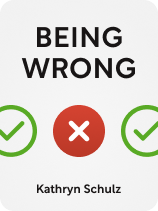

This article is an excerpt from the Shortform book guide to "Being Wrong" by Kathryn Schulz. Shortform has the world's best summaries and analyses of books you should be reading.
Like this article? Sign up for a free trial here.
What does it feel like to be completely wrong about something? What if you’re wrong about a belief that’s central to your identity?
In her book Being Wrong, Kathryn Schulz explores the emotional journey of discovering and coping with our mistakes. She delves into the stages we go through when confronted with error, from denial to acceptance.
Keep reading to discover how embracing uncertainty can lead to personal growth and compassion for others.
What to Do When You’re Wrong
Like everyone else, you hold a lot of beliefs. What if you’re wrong about one of them—or half of them? We’ve all felt the pain of making small mistakes—acknowledging the big ones throws us into turmoil. If you find out you’ve been wrong on a major level, especially about a core belief that part of your worldview hinges upon, it can trigger a full-blown existential crisis. As with grief, there are stages you’ll inevitably go through, including gauging the scope of how wrong you’ve been, denying your error or perhaps defending it, before hopefully accepting that you were wrong and finding a way to grow in response.
Schulz says that, when you learn you’ve been wrong, your first question will be to ask, “By how much?” Determining the scale of how wrong you are determines how many of your beliefs you’ll have to change, and how truthfully you can answer that question depends on how well you can take the emotional punch of admitting your mistakes. Your initial response will also include a measure of denial as a defense mechanism. Short-term denial isn’t necessarily bad. It can give you enough emotional breathing room to face up to your mistake once the initial shock has passed. Long-term denial is a different story. Instead of healthy growth, it’s rooted in deceit—lying to others and lying to yourself.
(Shortform note: While Schulz advocates a somewhat gentle approach to assessing your mistaken beliefs, hedge fund manager Ray Dalio recommends a more stringent form of self-reflection. In Principles, Dalio says that you must pursue the truth of any situation, and that to do so you have to always embrace the possibility that your views are wrong. The first challenge that Dalio draws attention to is overcoming the hurdle of your own ego—instead of assuming that your views are right, you must always ask, “How do I know I’m right?” The next step is to work around your blind spots by staying receptive to ideas that challenge your beliefs, a skill that requires humility and a degree of self-awareness.)
No two people react to being wrong in the same way, though Schulz writes that there are patterns. The storytelling part of your brain will generate theories about why you were wrong, and many of these will be defensive in nature. You may tell yourself that you were almost right, or that you were only wrong in certain ways—like arguing your company’s new product would have succeeded if only the timing of its release had been better. You might shift the blame for being wrong on someone else, or you might claim that you’d been right to be wrong—that you were erring on the side of safety. Whatever your approach, what you’re defending against is the pain of being wrong, not the fact of your mistake.
(Shortform note: The defensive measures that Schulz describes treat your beliefs as if they’re precious possessions. In Thinking in Bets, Annie Duke suggests a method to short-circuit your defensive tendencies while protecting you from other mental fallacies. The method is conceptually simple—imagine that you have to place a bet on every belief that you hold. How much money would you be willing to risk on any single one of your cherished beliefs? Duke’s method forces you to confront your ideas with a modicum of doubt and tricks you into weighing your beliefs from a rational, rather than emotional, perspective, which she contends can make you more open-minded and willing to consider alternate points of view.)
Accepting That You’re Wrong
Schulz argues that, while not all mistakes are bad, responding poorly to them only makes things worse. The healthiest approach is to accept mistakes and use them for growth. This requires openness to being wrong, acknowledging that your beliefs might be evolving, and recognizing that being right more and more of the time is an ongoing process.
Realizing you’re wrong can lead to positive change and exploration. Schulz recommends cultivating openness to being wrong, similar to how manufacturing industries anticipate and plan for potential failures. Using the language of uncertainty (e.g., “I’m not sure”) can help prepare you to admit mistakes when you make them.
Discovering fundamental errors in your beliefs can be painful, but Schulz notes that our identities are always changing. The key is to view being wrong as an opportunity for learning rather than a source of pain.

———End of Preview———
Like what you just read? Read the rest of the world's best book summary and analysis of Kathryn Schulz's "Being Wrong" at Shortform.
Here's what you'll find in our full Being Wrong summary:
- Why you shouldn’t try to completely avoid making mistakes
- The reasons why you get things wrong
- How to make mistakes without falling victim to shame and denial






